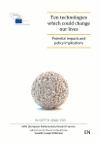 This report acts as a 'taster' for those interested in understanding more about how today's emerging technology trends could impact upon society in ways yet to be fully considered by policy-makers and the public. Europe in the 21st Century is a 'technological society'. Its citizens have seen rapid technological progress occur over a matter of decades; progress which has taken place at virtually every level of society and throughout the economy. As individuals and in groups we use a multitude of devices every day. These enable us to discover previously unexplored places, coordinate our activities at home and in the workplace, and communicate with each other instantaneously. Why do we surround ourselves with such technology? The answer is straightforward: technological advancement carries with it the promise of saving time, or doing more in the same amount of time. In short, innovation offers us the opportunity to 'do things more efficiently'.
This report acts as a 'taster' for those interested in understanding more about how today's emerging technology trends could impact upon society in ways yet to be fully considered by policy-makers and the public. Europe in the 21st Century is a 'technological society'. Its citizens have seen rapid technological progress occur over a matter of decades; progress which has taken place at virtually every level of society and throughout the economy. As individuals and in groups we use a multitude of devices every day. These enable us to discover previously unexplored places, coordinate our activities at home and in the workplace, and communicate with each other instantaneously. Why do we surround ourselves with such technology? The answer is straightforward: technological advancement carries with it the promise of saving time, or doing more in the same amount of time. In short, innovation offers us the opportunity to 'do things more efficiently'.
Innovation is looked to for stimulation of the growth of new industries and the creation of new jobs, but the wider impacts of innovation and technological progress must also be acknowledged. Assessing such impacts has however been historically difficult and is often cited as a priority issue for policy-makers. The scientific foresight discipline offers hope for a range of new policy-making tools which aim to improve understanding of the possible long-term consequences of our actions, with particular reference to potential impacts arising from the development and deployment of technological innovations.
Download: Ten Technologies which Could Change our Lives: Potential Impacts and Policy Implications (.pdf, 1.246 KB).
Download from eHealthNews.eu: Ten Technologies which Could Change our Lives: Potential Impacts and Policy Implications (.pdf, 1.246 KB).